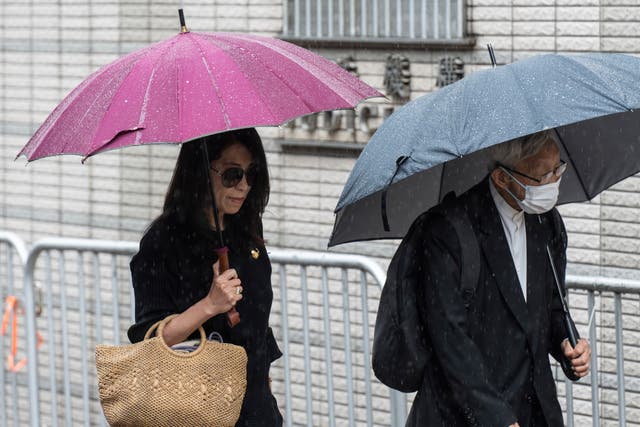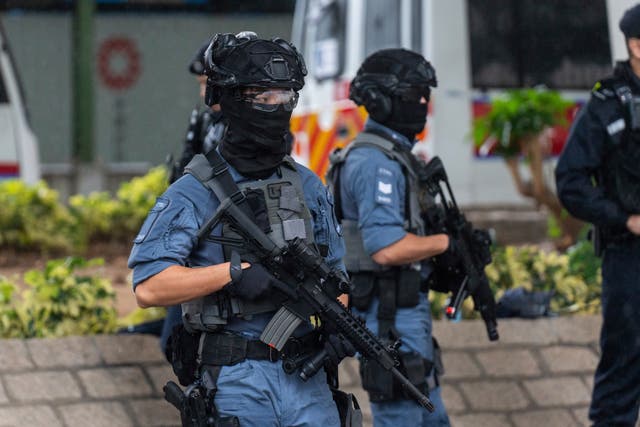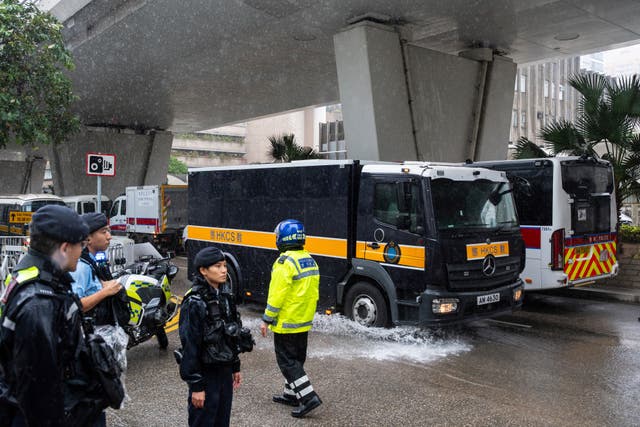Former Hong Kong publisher Jimmy Lai denied asking then-US vice president Mike Pence and then-secretary of state Mike Pompeo to take action against the city and China at meetings with them during the territory’s anti-government protests of 2019.
Lai, founder of the now-closed Apple Daily pro-democracy newspaper, was arrested in 2020 in the crackdown that followed the protests.
He is accused of colluding with foreign forces to endanger national security and conspiring with others to issue seditious publications. If convicted, he could face life in prison.
Lai testified about his meetings with former US officials and gave details about his alleged overseas political connections with people in America, Britain and Taiwan, including Taiwan ex-President Tsai Ing-wen and Hong Kong’s last British governor, Chris Patten.
But the media tycoon, who also describes himself as a businessman and social activist, said he never tried to influence foreign policy on Hong Kong or China through the people he met overseas or ask them to take action against them.

Lai testified in English that he asked Mr Pence to voice his support for Hong Kong, but not for the US government to take any action, saying: “It’s beyond me.”
During the same trip to the US, Lai also met with Mr Pompeo and discussed the situation in Hong Kong with him, noting it was a similar conversation to the one he had with Mr Pence, he said.
When Lai’s lawyer, Steven Kwan, asked him whether he had requested the US to do something at that meeting, Lai said “not to do something but to say something. To voice out its support for Hong Kong”.
Beijing promised to retain the former British colony’s civil liberties for 50 years when it returned to Chinese rule in 1997. But critics say that promise has become threadbare under the rubric of maintaining national security.
Authorities have used a Beijing-imposed national security law to prosecute many of Hong Kong’s leading activists, including Lai and 45 democracy advocates who were sentenced to several years in prison on Tuesday.
Other pro-democracy figures were forced into self-exile or silenced. Dozens of civil society groups have disbanded under the threat of the law.
Beijing and Hong Kong governments insist that the law restored stability to the city following the 2019 protests.
Prosecutors have alleged that Lai asked foreign countries, especially the United States, to take actions against Beijing “under the guise of fighting for freedom and democracy”.
They pointed to Lai’s meetings with Mr Pence, Mr Pompeo and US senators in July 2019 to discuss a now-withdrawn extradition bill that sparked the anti-government protests.

Upon entering the court, Lai waved and smiled at his family members, who sat next to the city’s Roman Catholic Cardinal Joseph Zen.
During the hearing, Lai said that he had introduced former US officials Paul Wolfowitz and Jack Keane to Ms Tsai – whom he called a friend. It was because Ms Tsai wanted to know more about the thinking of then President Donald Trump’s administration back then, he said.
Lai said that she knew he was “supportive of Trump” and she thought he knew a lot about the US because of his links with US think tanks. But he never communicated with Mr Trump, he said.
He said he wanted to help Taiwan to know how to better deal with the US, because the island was the only democracy of Chinese people.
But Lai rejected the idea of Hong Kong independence, saying it was a “crazy” idea and he never allowed his staff or the newspaper to mention it.
He said he broke into the media world because “to participate in delivering freedom” was a very good idea for him.
“The more you know, the more you are free,” he said.
He said the core values of Apple Daily were the core values of the people of Hong Kong, including the rule of law, freedom and the pursuit of democracy.

“I think it’s right for me to take up the responsibility of the company if anything happens to it as an owner,” he said.
The US and UK governments and a group of independent UN human rights experts have called for Lai’s release.
Mr Trump was asked on a podcast before his re-election this month whether he would talk to Chinese President Xi Jinping to seek Lai’s release, and he replied: “100%, I will get him out.”
Hong Kong leader John Lee said that mutual respect is important for the development of trade relations and there should be no interference in local affairs.
Prime Minister Sir Keir Starmer also raised concerns over Lai’s detention to Mr Xi in a meeting during the G20 summit in Brazil.
Hong Kong’s security minister Chris Tang maintained the prosecution was based on facts.
Lai’s son, Sebastien Lai, said on Friday that his father’s treatment in prison is “inhumane”.
He said: “My father is now 77 and has spent nearly four years in a maximum-security prison in solitary confinement.”






